Colon cancer is the third most common type of cancer, and the second most common cause of cancer-related death among Americans. In fact, the American Cancer Society estimates 101,420 new cases of colon cancer in United States for 2019. It is also expected to cause about 51,020 deaths this year.
Almost 90% of the people diagnosed with colon cancer are over the age of 50. The risk ratio of developing this form of cancer is 1:22 (4.49%) men, and 1:24 (4.15%) women. Other factors such as diet, physical activity, and health history can also affect one’s risk in developing cancer. Although this is a potentially fatal disease, it is mostly preventable. Through various efforts and healthy living, there are now more than 1 million colon cancer survivors in the US. To continuously provide support to patients and survivors, and to raise awareness, March has been declared as Colon Cancer Awareness Month.
One of the main objectives of the Awareness Month is to disseminate preventive measures. A way to lower your cancer risk is by taking simple lifestyle changes – like watching what you eat and making few dietary tweaks. Let’s start now by reading through the below list. These are the foods that fight colon cancer.
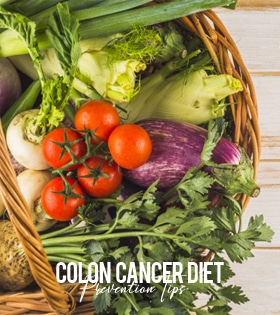
Both the Colon Cancer Alliance and the American Cancer Society suggest that eating a fiber-rich diet is essential to a healthy colon, and vegetables are one of the best sources of dietary fiber. Cruciferous vegetables such as broccoli, cabbage, kale, and Brussels sprouts are particularly beneficial as they naturally contain Sulforaphane, a product found to suppress the growth of cancerous tumors in the colon.
For every ten grams of fiber intake, your risk of suffering from colon cancer is lowered by around 10%. Studies show that people who eat cooked green vegetables once a day has a 24% lower risk of getting colon cancer than people who eat less. Indeed, there is a good reason why our parents urged us to eat our veggies.
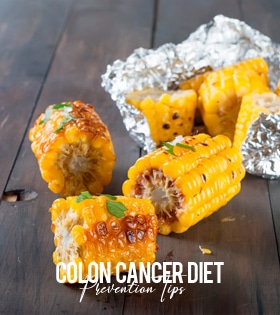
2. Buttered Corn
University of Maryland research shows that a compound found in corn fiber, Inositol Hexaphosphate, prevents colon cancer growth. Enjoy eating your corn cob by adding real butter for a dose of cancer-fighting conjugated linoleic acid (CLA).
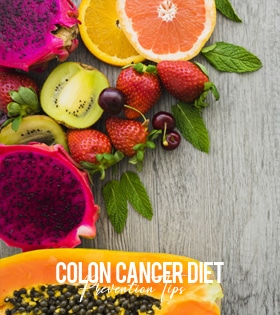
3. Fruits
Eating fruits is another way of adding fiber-rich food into one’s diet. Raspberries, pears, apples, bananas, and oranges may also help to prevent colon cancer because they contain antioxidants. Antioxidants are substances that help in delaying the effects of cell damages. Fiber found in fruits also keeps the colon healthy by keeping bowel movements regular and preventing constipation.
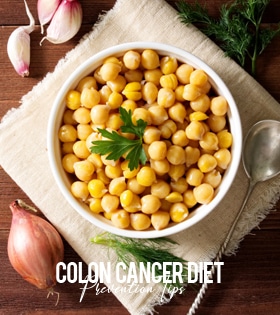
4. Whole grains
Whole grains are foods that naturally contain essential nutrients. Brown rice and legumes contain soluble fiber that dissolves in water and forms a gel in the gut. This gel helps keep bowel easier to pass. Grains also contain more colon-friendly vitamins, minerals, fiber, fatty acids, antioxidants and phytochemicals (natural compounds in plants that have a beneficial effect on the body) than their refined grain counterparts, such as white flour and white rice.
According to a study in Nutrition and Cancer, eating brown rice at least once a week reduced people’s risk of colon polyps—growths that may be precancerous—by 40%. Brown rice has 3.5 grams of fiber in one cup, compared to half a gram per cup of white rice. It is recommended that one should try to eat at least 30g of fiber every day. On the other hand, eating legumes—chickpeas, black beans, and peas—thrice a week reduce the risk of colon polyps by 33%, Loma Linda University researchers found.
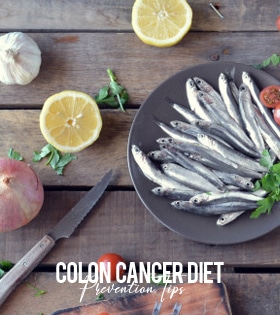
A diet rich in anti-inflammatory omega-3 has been linked to decreased incidences of colon cancer. Omega-3 oils are best found in cold water fish like mackerel, sardine, and cod, and are also available in flax oil. This potent substance helps to reduce the levels of inflammatory molecules which can promote cancer.
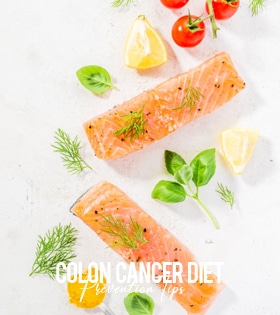
Recent research suggests that vitamin D deficiency may contribute to colon cancer. Three ounces of sockeye salmon (half of a typical portion) contains 112 percent of the recommended daily value of vitamin D.
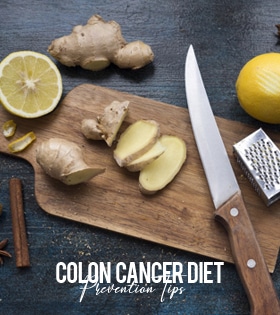
Cancer Research Prevention claims that taking a ginger root supplement for 28 days reduced colon inflammation by 28%. Colon inflammation has been associated with the development of tumors. Taking a 2-gram ginger root supplement or eating 2 tablespoons of fresh ginger with a meal daily is recommended.
To summarize, a great deal of studies has indicate that a diet consisting of vegetables, fruits and fish may offer the most protection against colon cancer — pesco -vegetarians (people who consume fish and veggies) were found to have a 45% reduced risk of cancer compared to non-vegetarians. Now that we know what to eat, here are some fluids that we can pair them with to keep ourselves hydrated.
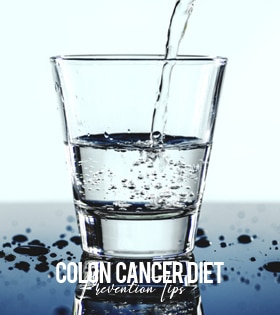
Besides the fact that we need to drink about 6-8 glasses of water every day to stop us from getting dehydrated, water and fiber are a great combination for good bowel health. Drinking water can lessen our thirst for sugary drinks such as cola and other artificial juices.
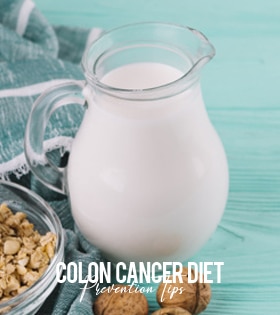
9. Milk
Recent studies have found that calcium may be associated with a decreased risk of colon cancer. However, the ACS does not recommend that men increase their calcium intake above the recommended amounts because there is a potential increased risk of prostate cancer associated with high calcium intake (exceeding 2,000 milligrams a day). Instead, both men and women should make sure to get their recommended daily dose of calcium: depending on age, that is 1,000 milligrams to 1,300 milligrams a day.
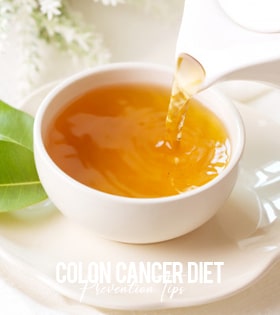
Antioxidants in the tea could keep cancer cells from growing. In fact, research from Louisiana State University and the University of North Carolina states that all it takes is one cup of tea a day to cut colon cancer risk in half. Another research from Oregon State University suggests that white tea is especially powerful at blocking colon-polyp growth.
Now that we know the foods that fight colon cancer and the perfect fluids to pair them with, all that is left for us to do is remain consistent. It’s hard to keep in mind that the choices we make now will affect us in the future, especially when our cravings for tantalizing flavors consume the best of us. But the more we understand how food impacts our bodies, the better we can arrange our eating habits to keep ourselves healthy.
Keeping a healthy lifestyle is important but it’s not the only way. The most powerful way to prevent colon cancer is still through screening. A colonoscopy is a structural examination of the colon that allows physicians to both screen for and prevent colorectal cancer. In line with the Colon Cancer Awareness month, we urge you to take a screening. This is, at the end of the day, the best way to check if our current lifestyle is actually working for us.
Be proactive about keeping yourself healthy. It will pay off! Order online vitamin, mineral, and nutrition tests online without a insurance, doctor’s prescription or visit. Shop shop our entire line of cancer screenings.

